“One day your life will flash before your eyes. Make sure its worth watching.” – Anonymous.
Picture taken during the Fulbright conference at the Hyatt Regency Hotel, Washington DC.
Professor Tom Lavalle is a great man. He is soft-spoken, he has sparse beards that cover much of his chin, and he smiles a lot. And he speaks Chinese! He is an American Professor in my department and he learnt, speaks and teaches Chinese language and literature. Isn’t that amazing? I met him for the first time on Monday even though we had been communicating a lot through email, and even though his office is just a stone throw from mine. For all I know, we may have gone past or maybe even bumped into each other more than once since August without knowing. For sure, the image of him that I had in my head before meeting him was not of someone of such height and demeanour. Why I had the preconceived image in my head, I have no idea. All I know is that when I met him, I was pleased. He is a pleasant person to talk with.
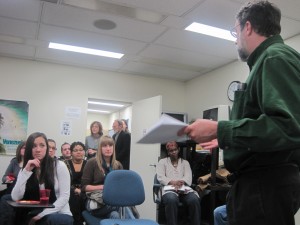 During the first email exchanges we had before we actually met, he had sent me these few translated poems from Chinese which I loved, so on meeting him, conversation inevitably turned to the subject of Chinese poetry and language and how it had influenced Japanese language and literature as well, especially in the form of writing. I learnt so many new things, about him, about China and about writing, language and culture. Why an American would be interested in Chinese poetry is not a question I would always ask, but I did ask for his own motivations, and I found them rooted in a craving for private space in the solace of words. He is a poet himself, writing in English, and his contact with Chinese writings had sparked a different kind of interest in him that has been sustained up to the present day. And because of him, students of this department now have the chance to learn Chinese language and culture at SIUE, and take field trips to a country of so much intriguing history.
During the first email exchanges we had before we actually met, he had sent me these few translated poems from Chinese which I loved, so on meeting him, conversation inevitably turned to the subject of Chinese poetry and language and how it had influenced Japanese language and literature as well, especially in the form of writing. I learnt so many new things, about him, about China and about writing, language and culture. Why an American would be interested in Chinese poetry is not a question I would always ask, but I did ask for his own motivations, and I found them rooted in a craving for private space in the solace of words. He is a poet himself, writing in English, and his contact with Chinese writings had sparked a different kind of interest in him that has been sustained up to the present day. And because of him, students of this department now have the chance to learn Chinese language and culture at SIUE, and take field trips to a country of so much intriguing history.
Because of meeting him, one day I hope to start learning Chinese. I don’t know where to start from though, whether on a lesson in good calligraphy or on a lesson in Chinese alphabets which I am very sure is larger than the English one. And unlike many of the students who register for the class, my motive will not really be in anticipation of, and preparation for the new world order where Chinese is spoken as a first language by all world citizens, but to access many of the different forms of expression of thought buried within the texts of old and classical Chinese poetry.
Well, maybe I lie when I say that, but how would you know?
“Drinking Wine” #4 of 4
Tao Qian (365-427)
Autumn chrysanthemums have beautiful color,
With dew on my clothes I pluck their flowers.
I float this thing in wine to forget my sorrow,
To leave far behind my thoughts of the world.
Alone, I pour myself a goblet of wine;
When the cup is empty, the pot pours for itself.
As the sun sets, all activities cease;
Homing birds, they hurry to the woods singing.
Haughtily, I whistle below the eastern balcony –
I’ve found again the meaning of life.
(Translated by Wu Chi-liu)
Apologies to all concerned readers of this blog who had wanted to make donations to the Red Cross in Nigeria for the Jos Relief efforts but couldn’t do so because of the problems of wire transfer. I take part of the blame for not making the best suggestions. Here now is my best idea since I found out today that wire transfer costs up to $50 in charges from the US to Nigeria. It hardly makes sense. If you want to donate to the Jos relief efforts by the Red Cross in Nigeria, please make said donations through Western Union to a reliable friend/acquaintance in Nigeria and have them pay the money into the Access bank account on your behalf. Then let them scan and send to you a proof of said payment, and we can take it from there. For those already in Nigeria, all you have to do is just to walk up to Access Bank Plc, and make your donations. The account information again is as follows:
ACCESS BANK PLC
ACCOUNT NAME: NIG. REDCROSS SOCIETY – JOS CRISIS RELIEF FUND
ACCOUNT NAME: 0430010005230
SORT CODE: 044080439
BRANCH: ADETOKUNBO ADEMOLA BRANCH, ABUJA
However, if you are an American and you do not have any Nigerian to send the money to, please leave me a comment here publicly, and send me a mail to let me know, and I will send you an my account number to send it to. Then I can send it home via Western Union and have someone pay it on your behalf.
So far, here is the breakdown of how much we have raised:
$145 from an anonymous in Illinois, who actually planned to donate $100, but due to bank wire charges, she ended up parting with $145 at the Bank of America. The money should be in Jos by now.
$80 from Clarissa my wonderful colleague at Edwardsville.
$50 from Tayo in Lagos for whom I may have to bring her artwork by hand when my time eventually runs out in this charming little town.
And finally, LaurensOnline.com, a shoe and bag-selling outfit in Lagos Nigeria has volunteered to sell all items from now till the end of stock at 20% off if you show proof of donation of any amount to the relief effort in Jos Nigeria. All you need to do is show such proof, and you get 20% off of your purchases. Without such proof, you still get a 10% off. So what are you waiting for? If you live in Lagos, find them for your Valentine purchases of shoes, bags and beads. My now famous boots are courtesy of them, so I know they sell quality.
This brings us to a gross total of $275 and a net of $230 so far raised. To all contributors, we say a big THANK YOU.
However, this offer to give free KTravularts will end with the month of February. If you are interested in the offer still, please hurry and make your donations now. Read details here.
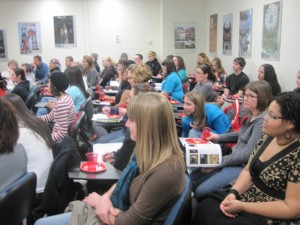 The long process that became today’s presentation began a little over a week ago when Prof Tom Lavalle, a professor of Chinese language and literature sent me a mail asking if I would be willing to kick off the “Discover Languages Month” with a public presentation. I said yes. He asked me to suggest a title, and I did. He liked it. I didn’t have too much time to plan for it however, which would explain why I had spent a few nights sleepless putting everything in form. For this, I also owe credits to the pictures on my room wall who listened to my mock pre-presentation, and to Deola, Zainab, Tayo and Chris who offered valuable suggestions after previewing the presentation. I also thank Clarissa who sat gently and almost anonymously at the back, smiling at almost everything I said, and blogging 🙂 but whose presence along with that of other colleagues and friends gave me the needed encouragement; and Belinda Carstens, my head of department who barraged me with questions when necessary, thus inevitably pointing me to a few things I seemed to have been taking for granted talking to a people from a different background.
The long process that became today’s presentation began a little over a week ago when Prof Tom Lavalle, a professor of Chinese language and literature sent me a mail asking if I would be willing to kick off the “Discover Languages Month” with a public presentation. I said yes. He asked me to suggest a title, and I did. He liked it. I didn’t have too much time to plan for it however, which would explain why I had spent a few nights sleepless putting everything in form. For this, I also owe credits to the pictures on my room wall who listened to my mock pre-presentation, and to Deola, Zainab, Tayo and Chris who offered valuable suggestions after previewing the presentation. I also thank Clarissa who sat gently and almost anonymously at the back, smiling at almost everything I said, and blogging 🙂 but whose presence along with that of other colleagues and friends gave me the needed encouragement; and Belinda Carstens, my head of department who barraged me with questions when necessary, thus inevitably pointing me to a few things I seemed to have been taking for granted talking to a people from a different background.
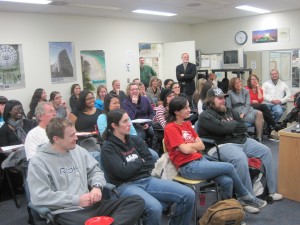 One of the most intriguing discussion from the talk came during the realization by a few members of the audience that we still had kings in Nigeria, within Yoruba kingdoms. “Are they all monarchies?” Someone asked. “No,” I said, and went into a long explanation about the peculiar (and prehistoric) republican nature of the kingship system in Ibadan in sharp contrast with the rest of Yoruba kingdoms in Oyo, Ife and elsewhere. Even to me, that was a moment of personal reflection and pride in the accomplishment of Ibadan ancestors who broke with tradition long before the British came, and did away with a succession system of government that is based on heredity like is practised in Oyo or Ife for a more meritocratic system based on long-standing and verifiable contribution to the society. Even at the end of the talk, a few more scholars came over to talk to me and ask questions about the kingship system. The kings, we discussed, do not have political powers as such in the country, but do occupy a status of responsibility that makes them indispensable in the proper governance of the country. There was also a question about spirituality. This elicited a response in reaffirmation of the Yoruba worldview: that which has never sought to impose its belief system on any other group of people for any reason. We had fought wars for women, for land, but never ever to spread a system of belief or to proselytize to our own way of life.
One of the most intriguing discussion from the talk came during the realization by a few members of the audience that we still had kings in Nigeria, within Yoruba kingdoms. “Are they all monarchies?” Someone asked. “No,” I said, and went into a long explanation about the peculiar (and prehistoric) republican nature of the kingship system in Ibadan in sharp contrast with the rest of Yoruba kingdoms in Oyo, Ife and elsewhere. Even to me, that was a moment of personal reflection and pride in the accomplishment of Ibadan ancestors who broke with tradition long before the British came, and did away with a succession system of government that is based on heredity like is practised in Oyo or Ife for a more meritocratic system based on long-standing and verifiable contribution to the society. Even at the end of the talk, a few more scholars came over to talk to me and ask questions about the kingship system. The kings, we discussed, do not have political powers as such in the country, but do occupy a status of responsibility that makes them indispensable in the proper governance of the country. There was also a question about spirituality. This elicited a response in reaffirmation of the Yoruba worldview: that which has never sought to impose its belief system on any other group of people for any reason. We had fought wars for women, for land, but never ever to spread a system of belief or to proselytize to our own way of life.
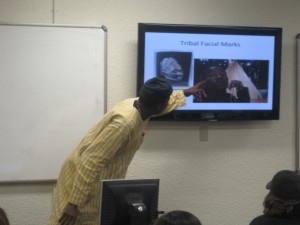 So there was food, plantain chips. There were over forty people in the audience, many of them standing. I saw a few old students in the audience, and a few current ones as well. How the old students knew about the event, I have no idea. Professor (Papa) Rudy showed up as well. It was my first time of seeing him this year. Also present was Prof Schaefer, professor of Linguistics, and SIUE Director of International Programmes who is no stranger to Nigeria himself, having taught at UNIBEN for many years and worked on the Edo language of Emai for a long time. I spoke about the mark on my face. I also spoke about the noted similarities between the Opa Oranmiyan and the Washington Monument; and about why I wear the cap in the United States even though I never did while I was in Nigeria; and about the meaning of names; and about masquerades, Lagbaja and the KKK (a little uncomfortable for me to broach); about Wole Soyinka and the many things he wrote about; among other topics. And then read a translated poem about The Owner of Yam and his Neighbour, which everyone seemed to have loved.
So there was food, plantain chips. There were over forty people in the audience, many of them standing. I saw a few old students in the audience, and a few current ones as well. How the old students knew about the event, I have no idea. Professor (Papa) Rudy showed up as well. It was my first time of seeing him this year. Also present was Prof Schaefer, professor of Linguistics, and SIUE Director of International Programmes who is no stranger to Nigeria himself, having taught at UNIBEN for many years and worked on the Edo language of Emai for a long time. I spoke about the mark on my face. I also spoke about the noted similarities between the Opa Oranmiyan and the Washington Monument; and about why I wear the cap in the United States even though I never did while I was in Nigeria; and about the meaning of names; and about masquerades, Lagbaja and the KKK (a little uncomfortable for me to broach); about Wole Soyinka and the many things he wrote about; among other topics. And then read a translated poem about The Owner of Yam and his Neighbour, which everyone seemed to have loved.
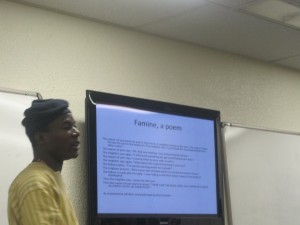 It was nice. I had fun. I’m guessing that from the response there will be more students next year registering for the Yoruba if the Fulbright commission decides to send more Yoruba teachers to this institution. I have also been told by professors whose students came to listen that they would be discussing what they learnt from the talk in their subsequent classes, and on Facebook groups created for the discussion of language ideas. I look forward to getting feedbacks from there. I enjoyed the talk. It was a nice but busy day. And oh, I also got the side pocket of my dress badly torn by a loose metal during the first jittery moments of sitting alone in front of the so large audience. Now I’ll need to find a good tailor to mend it, or leave it as a marker of this interesting speech-giving experience.
It was nice. I had fun. I’m guessing that from the response there will be more students next year registering for the Yoruba if the Fulbright commission decides to send more Yoruba teachers to this institution. I have also been told by professors whose students came to listen that they would be discussing what they learnt from the talk in their subsequent classes, and on Facebook groups created for the discussion of language ideas. I look forward to getting feedbacks from there. I enjoyed the talk. It was a nice but busy day. And oh, I also got the side pocket of my dress badly torn by a loose metal during the first jittery moments of sitting alone in front of the so large audience. Now I’ll need to find a good tailor to mend it, or leave it as a marker of this interesting speech-giving experience.
Well, there’s the report. I am glad to be here at this department of foreign languages at this point in time. You too should have been there.